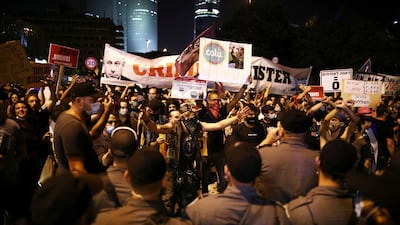Thousands of Israelis took to the streets in downtown Tel Aviv on Saturday, protesting what is widely seen as Prime Minister Benjamin Netanyahu’s failure to address the economic impact of the Covid-19 pandemic.
Many Israelis believe government has not done enough to compensate hundreds of thousands of workers who lost their jobs as a result of restrictions and shutdowns.
Unemployment has surged 21 per cent since Israel went into lockdown in March, and aid packages promised by the government have been slow to come through. These had led to Mr Netanyahu’s popularity plummeting.
The protest in central Tel Aviv’s Rabin Square brought together the unemployed, self-employed, entrepreneurs and business owners.
Participants wore masks, but did not appear to be following social distancing rules.
Alarmed by a new spike in coronavirus cases, which surged after the economy began reopening, Mr Netanyahu this week reimposed a series of restrictions in a bid to contain infections, closing many businesses again.
"I have 40 workers with no income, no money," said Michal Gaist-Casif, vice president of a sound and lighting company.
"We need the government to pump in money until we're back to normal. We haven't been working since mid-March through April, May, June and July, and August is looking to be a catastrophe."
On Thursday, Mr Netanyahu announced an economic “safety net” promising quick relief to the self-employed and stipends over the coming year for struggling workers and business owners.
The government is expected to approve the plan on Sunday.
But the large turnout at Rabin Square was a sign of widespread discontent with the government’s policies.
Despite successfully keeping the outbreak under control in the spring, Israel’s new government, which took office in May, has been accused by some of reopening the economy too quickly. That has caused a new spike in infections, which is expected to put more people out of work as a result of renewed closures.
Authorities now report record levels of more than 1,000 new cases a day, higher than any peak in the spring as the death toll nears 340.
"People feel helpless, there's no response. They are enraged and want the government to take responsibility," said Roee Cohen, president of the Israel Chamber of Independent Organisations and Businesses.
In the face of an angry electorate, Mr Netanyahu's support has tumbled. A recent Midgam Research & Consulting poll on Channel 12 TV found just 46 per cent of respondents approved of Mr Netanyahu's job performance, down from 74 per cent in May.









